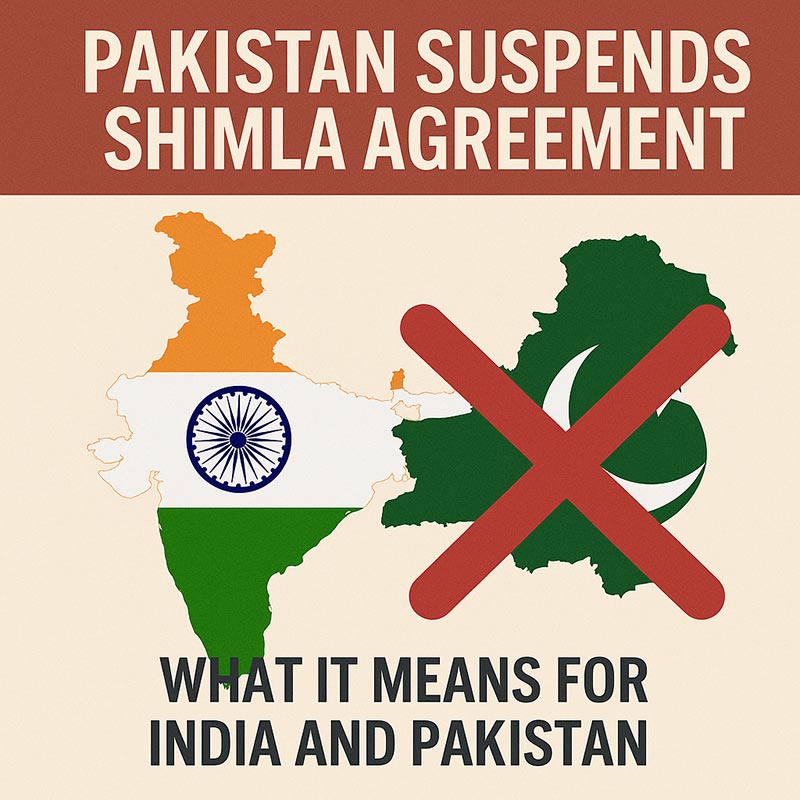Pakistan Suspends Shimla Agreement After Indus Water Treaty Suspension: What It Means for India and Pakistan

In a shocking incident that has horrified the nation, 26 unarmed Hindu tourists were brutally killed by Pakistani terrorists after being identified by their religion. This heinous attack, one of the worst of its kind, has not only outraged Indians but also highlighted the grim reality that significant sections of Pakistan’s population openly sympathize with terrorist activities.
In swift retaliation, the Indian Government suspended the Indus Waters Treaty, a decades-old water-sharing agreement with Pakistan. In response, the Pakistani Government announced the suspension of the Shimla Agreement, a cornerstone treaty governing peace and bilateral relations between the two countries since 1972.
Let’s dive deeper into the Shimla Agreement, understand its significance, and analyze what the suspension of this agreement will mean for both India and Pakistan.
What is the Shimla Agreement?
The Shimla Agreement was signed between India and Pakistan on July 2, 1972, following the Indo-Pakistani War of 1971, which resulted in the creation of Bangladesh.
The agreement was signed by:
Indira Gandhi, Prime Minister of India
Zulfikar Ali Bhutto, President of Pakistan
Key Provisions of the Shimla Agreement:
Peaceful Resolution: Both nations committed to resolving disputes peacefully through bilateral talks, without external intervention.
Respect for the Line of Control (LoC): Both countries agreed to respect the LoC in Jammu and Kashmir without altering it unilaterally.
Normalization of Relations: Efforts to restore diplomatic relations, economic ties, and cultural exchanges.
Non-Alteration by Force: Both sides agreed that they would not use force or the threat of force to settle disputes.
In essence, the Shimla Agreement established the framework for peaceful coexistence and direct dialogue between India and Pakistan.
Why Was the Shimla Agreement Entered Into?
The Shimla Agreement was a direct result of the 1971 war, which had deeply humiliated Pakistan. Over 90,000 Pakistani soldiers were taken as prisoners of war by India. Pakistan needed a political settlement to ensure their safe release and to seek restoration of normalcy.
For India, the agreement was an opportunity to:
Cement its victory diplomatically
Establish peace in the subcontinent
Reinforce that Kashmir would be settled bilaterally, thereby reducing international intervention (particularly by the United Nations)
Thus, the Shimla Agreement was critical to the post-war order in South Asia.
Impact of the Shimla Agreement Over the Years
Maintained Relative Stability: Despite tensions and wars (like Kargil in 1999), the Shimla Agreement served as a reference point for diplomacy.
Limited Internationalization of Kashmir Issue: Pakistan’s attempts to raise Kashmir at the UN were often dismissed citing the bilateral nature of the Shimla Agreement.
Framework for Talks: Many peace initiatives (like the Lahore Declaration, Agra Summit) have cited the Shimla Agreement as a foundation.
Though periodically violated, the agreement provided a diplomatic shield for India, ensuring that issues remained bilateral and not subject to international pressure.
What Will Be the Impact of Suspension of the Shimla Agreement?
The suspension of the Shimla Agreement marks a dangerous shift. It opens the door for a far more aggressive posture from both sides.
Possible Consequences:
End of Bilateralism: Pakistan can now officially internationalize the Kashmir issue again — raising it at the UN, OIC, or seeking intervention by major powers.
Increased Tensions at the LoC: Without an agreement to respect the LoC, the border could see increased skirmishes and military actions.
Impact on Prisoner Exchanges and Trade: Existing frameworks that allowed for diplomatic and humanitarian interactions could collapse.
Loss of Diplomatic Credibility: Pakistan’s decision to suspend an internationally recognized agreement could be seen negatively by the global community.
Rise in Terror Activities: Without diplomatic engagement, terror groups may feel emboldened.
Who Will Suffer More – India or Pakistan?
Pakistan is likely to suffer more than India for several reasons:
International Isolation: Pakistan will find it harder to justify suspension of a peace agreement when seeking international support.
Economic Pressure: Pakistan’s economy is already on life support. Rising tensions with India will further destabilize its economy.
Diplomatic Backlash: Pakistan’s move could be viewed as an act of aggression, undermining its credibility globally.
Water Scarcity: Suspension of the Indus Waters Treaty is a far bigger blow to Pakistan than the Shimla Agreement is to India. Pakistan relies heavily on rivers flowing from India for agriculture and drinking water.
India, on the other hand, is better positioned diplomatically, economically, and militarily to handle the fallout.
How the Suspension of the Shimla Agreement Benefits India More
End of Bilateral Limitations under the Shimla Agreement
The suspension of the Shimla Agreement by Pakistan removes the decades-old restriction on India to resolve disputes with Pakistan only through bilateral dialogue. Since 1972, India has adhered to this framework despite repeated violations and provocations from Pakistan, especially on issues related to Jammu and Kashmir. With the agreement now suspended, India can bring global attention to cross-border terrorism and human rights violations committed by Pakistan. It paves the way for India to raise the issue of Pakistan-sponsored terrorism in international platforms like the United Nations, G20, BRICS, and QUAD. This global engagement, unrestricted by the Shimla Agreement’s bilateral clause, enhances India’s diplomatic outreach and strengthens its position as a responsible global power.
Stronger Position on Kashmir and Pakistan-Occupied Kashmir (PoK)
India now gains more strategic flexibility in relation to Jammu & Kashmir and Pakistan-Occupied Kashmir (PoK). The Shimla Agreement’s underlying premise of maintaining the status quo through dialogue no longer constrains Indian policy. This shift allows India to take assertive actions — diplomatically and possibly militarily — to reclaim its territorial rights over PoK. India can now intensify its campaign to internationally expose the illegal occupation of PoK by Pakistan and emphasize its rightful claim over the entire region of Jammu & Kashmir. This will also enable India to enhance infrastructure, increase troop preparedness, and assert sovereignty in border areas without diplomatic backlash.
Global Sympathy Favors India Post Terror Attack
The horrifying killing of 26 Hindu pilgrims by Pakistan-based terrorists has drawn widespread condemnation across the globe. In such an emotionally charged international environment, Pakistan’s move to suspend a peace agreement like the Shimla Accord further discredits its commitment to peace and diplomacy. This misstep by Pakistan enhances India’s credibility as the victim of terrorism and as a nation seeking stability. The global community is more likely to rally behind India’s narrative of security, secularism, and counter-terrorism, leading to stronger strategic partnerships and increased international cooperation in intelligence sharing and defense alliances.
Enhanced Military and Border Security Freedom
India’s security forces are now freer to respond decisively to any provocation without being accused of violating the Shimla Agreement. The Indian Armed Forces and intelligence agencies can plan preemptive or retaliatory strikes against terrorist camps operating from Pakistani soil. Additionally, India can scale up border surveillance, deploy advanced drone systems, and build infrastructure without diplomatic hindrance. The removal of diplomatic constraints under the Shimla Agreement boosts India’s ability to secure its borders and protect civilians from cross-border threats, especially in Jammu & Kashmir.
Scope to Reassess Other Treaties Like Indus Waters Treaty
Pakistan’s unilateral suspension of the Shimla Agreement sets a precedent that allows India to reconsider its commitment to other bilateral treaties — most notably the Indus Waters Treaty. India has already taken preliminary steps to reassess this water-sharing arrangement, especially after repeated acts of terrorism. Without the burden of maintaining diplomatic decorum tied to outdated agreements, India can channel more water from the western rivers for its own agricultural and hydropower needs. This strengthens India’s domestic water security, particularly for states like Punjab, Haryana, and Rajasthan.
Political and Strategic Advantage Within India
Domestically, the Indian government can leverage the situation to build national unity and political support around issues of security, sovereignty, and foreign policy. The suspension of the Shimla Agreement, coupled with public outrage over the massacre of innocent Hindu tourists, consolidates public opinion against terrorism and justifies firm action. It portrays India as a strong and decisive nation, enhancing public confidence in the government and armed forces. This unified national sentiment also acts as a deterrent to any future aggressions by Pakistan.
Conclusion: India Gains Strategically and Diplomatically
The suspension of the Shimla Agreement, rather than hurting India, gives it a strategic upper hand. It allows India to abandon the failed bilateral approach and move toward globalizing its concerns, especially regarding Pakistan’s role in fostering terrorism. India is no longer shackled by a diplomatic framework that Pakistan itself never respected. From military preparedness to diplomatic freedom, from domestic politics to international alliances — India gains on all fronts. The current shift is not a setback for India but a significant opportunity to advance its national interests assertively and globally.

